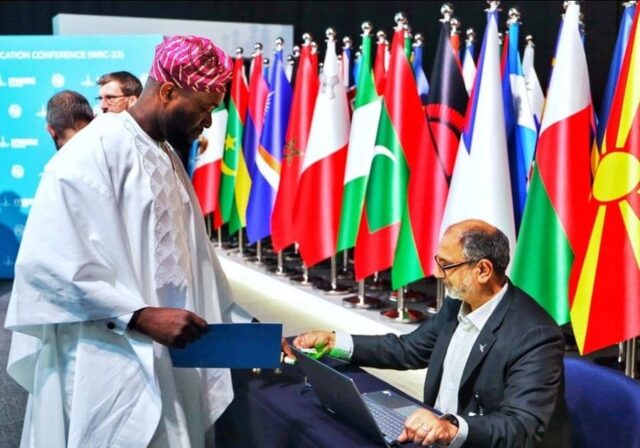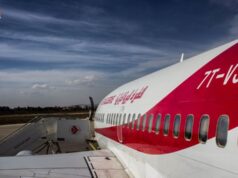
TUE, DEC 19 2023-theGBJournal|Nigeria has signed the World Radiocommunication Conference 2023 Final Acts (WRC-23), an agreement on revisions to the global treaty governing the use of the radio frequency spectrum, both on Earth and in space.
The Minister of Communication, Innovation and Digital Economy, Dr. Bosun Tijani who led the Nigerian delegation signed the Final Act of the Radio Regulations on Nigeria’s behalf.
Dr. Bosun Tijani was joined by the Executive Vice Chairman of the Nigerian Communications Commission (NCC), Dr. Aminu Maida, the Managing Director, Nigerian Communications Satellite Limited (NigComSat), Jane Egerton-Idehen, as well as members of the Nigerian delegation present.
The agreement signed at the close WRC-23 on 15 December, 2023 in Dubai, United Arab Emirates, was also signed by 151 Member States.
The conference reviews and updates the international treaty, Radio Regulations, governing spectrum and satellite orbits since 1906.
Overall, the WRC-23 approved 43 new resolutions and revised 56 existing ones. Over 3,900 delegates from 163 Member States attended WRC-23, including 88 ministerial-level participants.
The Final Acts constitute a record of the decisions taken at the conference including both the new and revised provisions of the Radio Regulations, all Appendices, and the new and revised Resolutions.
Among the decisions, WRC-23 identified spectrum for International Mobile Telecommunications (IMT), which will be crucial for expanding broadband connectivity and developing IMT mobile services, also known as 4G, 5G and, in the future, 6G.
That new spectrum includes the 3 300-3 400 megahertz (MHz), 3 600-3 800 MHz, 4 800-4 990 MHz and 6 425-7 125 MHz frequency bands in various countries and regions.
WRC-23 also identified the 2 GHz and 2.6 GHz bands for using high-altitude platform stations as IMT base stations (HIBS) and established regulations for their operations.
This technology offers a new platform to provide mobile broadband with minimal infrastructure using the same frequencies and devices as IMT mobile networks.
HIBS can contribute to bridging the digital divide in remote and rural areas and maintain connectivity during disasters.
For non-geostationary fixed-satellite service Earth Stations in Motion (ESIMs), the conference identified new frequencies to deliver high-speed broadband onboard aircraft, vessels, trains, and vehicles.
These satellite services are also critical following disasters where local communication infrastructure is damaged or destroyed.
Provisions were included to protect ship and aircraft mobile service stations located in international airspace and waters from other stations within national territories.
To support the modernization of the Global Maritime Distress and Safety System (GMDSS), WRC-23 took regulatory actions including the implementation of e-navigation systems to enhance distress and safety communications at sea.
The conference provisionally recognized the BeiDou Satellite Messaging Service System for GMDSS use, subject to successful completion of coordination with the existing networks and elimination of interference.
The WRC-23 negotiations were led by conference Chair, H.E. Eng. Mohammed Al Ramsi from the United Arab Emirates with assistance from six committee chairs: Basebi Mosinyi (Botswana); Cindy Cook (Canada); Hiroyuki Atarashi (Japan); Anna Marklund (Sweden); Abdouramane El Hadjar (Cameroon); and Christian Rissone (France).
X-@theGBJournal|Facebook-the Government and Business Journal|email:gbj@govbusinessjournal.com|govandbusinessj@gmail.com









